Janice Hardy's Blog, page 50
April 8, 2020
Identifying a Loss of Momentum vs. Writer’s Block
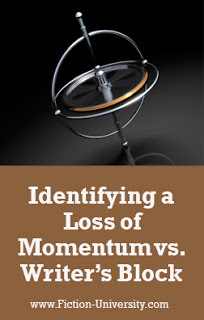 By Janice Hardy, @Janice_Hardy
By Janice Hardy, @Janice_Hardy Some days, we sit down to write and the words won’t come. Are we blocked? Maybe not.
Even before the pandemic and quarantine intruded into life, I’d hit a patch in my writing where I wasn’t getting much done. I’d just finished a major revision, so this wasn’t unexpected—I usually need a break after a draft is done—but it dragged on longer than usual. Every time I sat down to write, I couldn’t.
I wasn’t blocked, I knew that. I just didn’t have any urge to write even though I knew I should be writing. I’ve been writing long enough that I knew the difference, but not every writer has realized yet that just because you have trouble writing, doesn’t mean something is wrong.
Not Being Able to Write Doesn’t Always Mean You Have Writer’s Block
We get tired. We get stressed. We have insane things going on in the world that sap our energy. These things can easily make it difficult if not impossible to write. And thankfully, it’s temporary.
Continue ReadingWritten by Janice Hardy. Fiction-University.com
Published on April 08, 2020 05:45
April 7, 2020
Writing in the Time of Covid-19
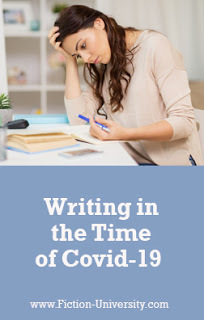 By Jodi Turchin, @jlturchin
By Jodi Turchin, @jlturchinPart of The Writer's Life Series
JH: There world is a challenging place right now, and stress can easily sap a writer's creative energy. Jodi Turchin shares tips on writing in the world of Covid-19.
Jodi Turchin is a Young Adult novelist represented by Dawn Frederick at Red Sofa Literary. She’s also a photographer, a high school English teacher, a former actress and director, an Independent Scentsy Consultant, and a Younique presenter.
Website | Twitter
Take it away Jodi…
Continue ReadingWritten by Janice Hardy. Fiction-University.com
Published on April 07, 2020 03:00
April 6, 2020
Oh, That's Subtle: The Little Things Holding Your Novel Back
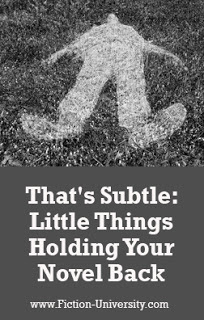 By Janice Hardy, @Janice_Hardy
By Janice Hardy, @Janice_Hardy Subtlety can mean the difference between a novel that works and one that falls flat.
The smallest change have a big impact on your writing. One word change, one shift in perspective, and everything's different. Hopefully such changes result in a better story, but when they don't, spotting what's wrong can be frustrating.
Maybe you're struggling with a story right now, or submitting one that's getting good feedback, but just not quite landing anywhere, or having beta readers tell you it's good, but not great, and it's lacking something they can't put their finger on. You know you can fix it if you could just find it.
Take a closer look and see if there's a subtle reason that's holding your novel back.
Continue ReadingWritten by Janice Hardy. Fiction-University.com
Published on April 06, 2020 04:01
April 4, 2020
WIP Diagnostic: Is This Working? A Closer Look at a Historical YA Opening
 Critique By Maria D'Marco
Critique By Maria D'MarcoWIP Diagnostics is a weekly column that studies a snippet of a work in progress for specific issues. Readers are encouraged to send in work with questions, and we diagnose it on the site. It’s part critique, part example, and designed to help the submitter as well as anyone else having a similar problem.
If you're interested in submitting to WIP Diagnostics, please check out these guidelines.
Submissions currently in the queue: Two
Please Note: As of today, critique slots are booked through April 18.
This week’s question:
Is this working?
Market/Genre: Young Adult
On to the diagnosis…
Continue ReadingWritten by Janice Hardy. Fiction-University.com
Published on April 04, 2020 05:16
April 3, 2020
5 Questions to Ask for Stronger Scenes
 By Janice Hardy, @Janice_Hardy
By Janice Hardy, @Janice_Hardy If you have trouble plotting, ask these five questions in every scene.
I've always been a natural plotter. That doesn't mean I was always good at it, mind you, just that figuring out what my characters had to do rarely left me scratching my head.
I think it's because I typically think in "What has to happen in this scene?" terms. And the action, the "what happens" is driven by a character with goal. Create a problem, toss in something that has to happen, add a protagonist who needs something, and voila, you have a plot.
In basic terms, a plot is a series of events that allow you to illustrate your story. It's simple, yet often difficult, which is why so many writers struggle with it.
As you start your scene, your protagonist will have a goal. It'll probably be a story goal, because the whole point is to move the story forward, right? But maybe it's a smaller goal, or a internal goal, or a unconscious goal. Maybe it's not anything they want, but something you as the author wants.
Continue ReadingWritten by Janice Hardy. Fiction-University.com
Published on April 03, 2020 03:00
April 2, 2020
What’s a Chapter? And How Long Should it Be?
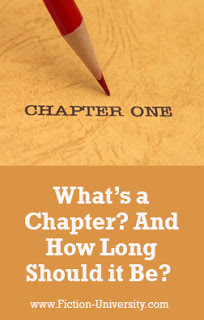 By Dario Ciriello
By Dario CirielloPart of the How They Do It Series
JH: Chapters are the typical way writers break up a novel, but what's the right way to handle them? Dario Ciriello shares thoughts and tips on handling your novel's chapters.
I was recently asked by a writer how long a chapter should be, and how do you know where to end it. My first reaction was to smile and quote the old English saying, how long is a piece of string? In fiction, there really no rule, which set me thinking on what exactly a chapter is. Is it an organizing principle, or simply a device of convenience?
Chapters in fiction became common in the mid-eighteenth century. Novelist Henry Fielding, in 1742, gave a lovely description of the divisions between chapters as “an Inn or Resting-Place, where he may stop and take a Glass, or any other Refreshment, as it pleases him.” At the time, the average chapter was quite brief, perhaps 1,800 words, and typically encumbered with a mini-index listing its contents, such as, say,
CHAPTER TWELVE: Mr. Stevens woos the chambermaid, with interesting resultsOr more – much more. Some nineteenth-century chapters in particular could contain several sentences in a list divided by semicolons.
Continue ReadingWritten by Janice Hardy. Fiction-University.com
Published on April 02, 2020 03:00
April 1, 2020
How to Set Tone and Mood in Your Scenes
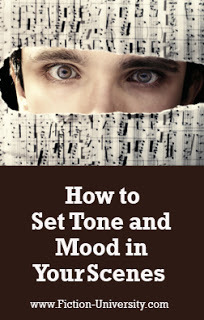 By Janice Hardy, @Janice_Hardy
By Janice Hardy, @Janice_HardySetting the right tone can go a long way to drawing readers into your story and keeping their attention.
I'm a little weird when it comes to scary movies. I enjoy (most) of them, but sometimes I also get so tense I can't watch them. I figured out ages ago it the music that gets me, not the scene itself. It builds, pokes at my emotions, and builds the tension in a masterful way that also builds my anticipation and fear. This also happens in games during boss fights or any mission with really stressful music.
When a movie or game starts getting to me, I mute the volume and all that built-up tension drops to the floor.
What do movie scores have to do with tone and mood?
Continue ReadingWritten by Janice Hardy. Fiction-University.com
Published on April 01, 2020 03:00
March 31, 2020
How to Be a Productive, Healthy Writer During Mentally Draining Times
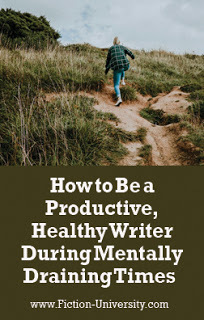 By Dave Chesson, @DaveChesson
By Dave Chesson, @DaveChessonPart of The Writer's Life Series
JH: As quarantine continues, it puts more and more of a drain on us mentally and emotionally. Dave Chesson shares five steps for managing these troubling times.
Dave Chesson is the founder of Kindlepreneur.com and creator of Publisher Rocket, a software that helps authors market their books more effectively.
Website | Twitter | Facebook
Take it away Dave…
Continue ReadingWritten by Janice Hardy. Fiction-University.com
Published on March 31, 2020 03:00
March 30, 2020
The Pros and Cons of Studying the Writing Craft
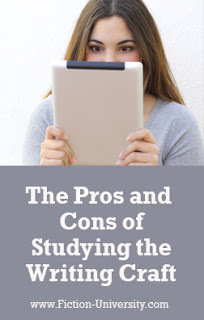 By Janice Hardy, @Janice_Hardy
By Janice Hardy, @Janice_Hardy Studying the craft of writing is useful to improve your skill, but at what point does it become a hindrance?
I received an interesting email last week from a woman who’s taking advantage of her quarantine to study up and improve her writing. She’s been reading a lot of craft books, and was wondering if a writer could read too much—could their education outweigh their skill?
Short answer: Yes, absolutely.
Long answer: Still yes, but with more detail (grin).
When I was starting out, books and school were pretty much the only ways to get a writing education. There were writing conferences out there, but they were harder to find since the Internet was still new and just becoming the behemoth it is today (and for the record, this was early ’90s. I’m not a dinosaur yet).
Continue ReadingWritten by Janice Hardy. Fiction-University.com
Published on March 30, 2020 05:33
March 28, 2020
WIP Diagnostic: Is This Working? A Closer Look at a Prologue
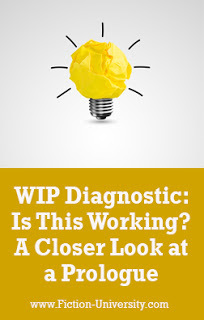 Critique By Janice Hardy, @Janice_Hardy
Critique By Janice Hardy, @Janice_HardyWIP Diagnostics is a weekly column that studies a snippet of a work in progress for specific issues. Readers are encouraged to send in work with questions, and we diagnose it on the site. It’s part critique, part example, and designed to help the submitter as well as anyone else having a similar problem.
If you're interested in submitting to WIP Diagnostics, please check out these guidelines.
Submissions currently in the queue: One
Please Note: As of today, critique slots are booked through April 4.
This week’s question:
Is this prologue working?
Market/Genre: Unspecified
On to the diagnosis…
Continue ReadingWritten by Janice Hardy. Fiction-University.com
Published on March 28, 2020 05:45



